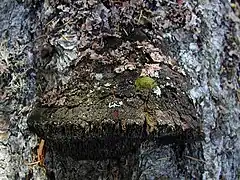Echinodontium tinctorium
Echinodontium tinctorium is a species of fungus in the family Echinodontiaceae. A plant pathogen, it is commonly known as the Indian paint fungus. Found on tree species such as grand fir (and indicating a rotten core), it can be identified by the grayish spines of its lower surface.[1]
| Echinodontium tinctorium | |
|---|---|
 | |
| Scientific classification | |
| Kingdom: | |
| Division: | |
| Class: | |
| Order: | |
| Family: | |
| Genus: | |
| Species: | E. tinctorium |
| Binomial name | |
| Echinodontium tinctorium | |
| Synonyms | |
Native Americans used the red interior as a pigment.[1] Some Plateau Indian tribes applied the fungus to skin to prevent it from chapping.[2] It is inedible.[3]
References
- Arno, Stephen F.; Hammerly, Ramona P. (2020) [1977]. Northwest Trees: Identifying & Understanding the Region's Native Trees (field guide ed.). Seattle: Mountaineers Books. pp. 133–134. ISBN 1-68051-329-X. OCLC 1141235469.
- Hunn, Eugene S. (1990). Nch'i-Wana, "The Big River": Mid-Columbia Indians and Their Land. University of Washington Press. p. 353. ISBN 0-295-97119-3.
- Phillips, Roger (2010). Mushrooms and Other Fungi of North America. Buffalo, NY: Firefly Books. p. 328. ISBN 978-1-55407-651-2.
This article is issued from Wikipedia. The text is licensed under Creative Commons - Attribution - Sharealike. Additional terms may apply for the media files.